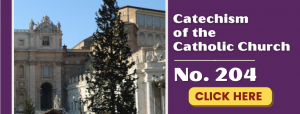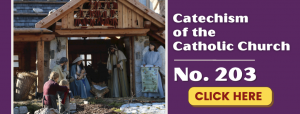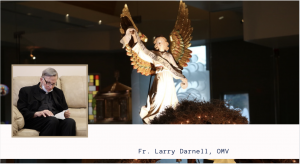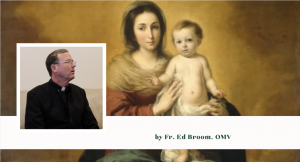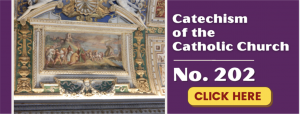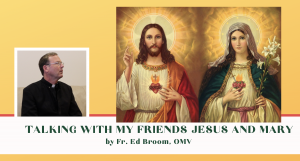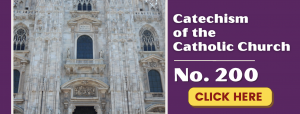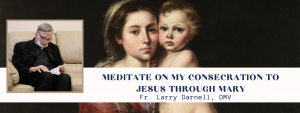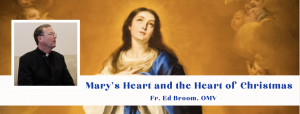Wednesday of the Fourth Week of Advent

PART ONE: LISTEN TO RETREAT TALK ON FACEBOOK FORUM WITH FR. LARRY AND FR. ED
PART TWO: MEDITATE ON THREE (3) GOSPELS ON THE BIRTH OF CHRIST BY FR. LARRY DARNELL, OMV
PART THREE: POINTS OF MEDITATION ON GOSPEL AND POTENTIAL POWER IN PRIESTLY PATERNITY By Father Ed Broom, OMV

Three (3) Gospels on the Birth of Christ
l. A Reading from the Holy Gospel of St. Luke 2:1-4
In those days a decree went out from Caesar Augustus
that the whole world should be enrolled.
This was the first enrollment, when Quirinius was governor of Syria.
So all went to be enrolled, each to his own town.
And Joseph too went up from Galilee from the town of Nazareth
to Judea, to the city of David that is called Bethlehem,
because he was of the house and family of David,
to be enrolled with Mary, his betrothed, who was with child.
While they were there, the time came for her to have her child,
and she gave birth to her firstborn son.
She wrapped him in swaddling clothes and laid him in a manger,
because there was no room for them in the inn.
Now there were shepherds in that region living in the fields
and keeping the night watch over their flock.
The angel of the Lord appeared to them
and the glory of the Lord shone around them,
and they were struck with great fear.
The angel said to them,
“Do not be afraid;
for behold, I proclaim to you good news of great joy
that will be for all the people.
For today in the city of David
a savior has been born for you who is Christ and Lord.
And this will be a sign for you:
you will find an infant wrapped in swaddling clothes
and lying in a manger.”
And suddenly there was a multitude of the heavenly host with the angel, praising God and saying:
“Glory to God in the highest
and on earth peace to those on whom his favor rests.”
ll. A Reading from the Holy Gospel of St. Luke 2:15-20
When the angels went away from them to heaven,
the shepherds said to one another,
“Let us go, then, to Bethlehem
to see this thing that has taken place,
which the Lord has made known to us.”
So they went in haste and found Mary and Joseph,
and the infant lying in the manger.
When they saw this,
they made known the message
that had been told them about this child.
All who heard it were amazed
by what had been told them by the shepherds.
And Mary kept all these things,
reflecting on them in her heart.
Then the shepherds returned,
glorifying and praising God
for all they had heard and seen,
just as it had been told to them.
lll. A Reading from the Holy Gospel of St. John 1:1-5, 9-14
In the beginning was the Word,
and the Word was with God,
and the Word was God.
He was in the beginning with God.
All things came to be through him,
and without him nothing came to be.
What came to be through him was life,
and this life was the light of the human race;
the light shines in the darkness,
and the darkness has not overcome it.
The true light, which enlightens everyone, was coming into the world.
He was in the world,
and the world came to be through him,
but the world did not know him.
He came to what was his own,
but his own people did not accept him.
But to those who did accept him
he gave power to become children of God,
to those who believe in his name,
who were born not by natural generation
nor by human choice nor by a man’s decision but of God.
And the Word became flesh
and made his dwelling among us,
and we saw his glory,
the glory as of the Father’s only Son,
full of grace and truth.
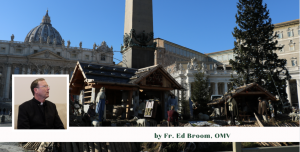 “For greater things you were born.” (Ven. Mother Luisita)
“For greater things you were born.” (Ven. Mother Luisita)
WEDNESDAY, DECEMBER 23rd Lk. 1: 57-66 “He asked for a tablet and wrote: ‘John is his name’ and all were amazed. Immediately his mouth was opened, his tongue freed, and he spoke blessing God.”
Part 1: His name is John… from the writings of Saint Pope John Paul II
Part 2: POTENTIAL POWER IN PRIESTLY PATERNITY by Father Ed Broom, OMV
PART 1: From the writings of Saint Pope John Paul II…
His name is John. Before his astonished kinsmen, Zechariah confirms that this is the name of his son, writing it on a tablet. God himself, through his angel, had given that name, which in Hebrew means “God is benevolent.” God is benevolent to human beings: he wants them to live; he wants them to be saved. God is benevolent to his people: he wants to make of them a blessing for all the nations of the earth. God is benevolent to humanity: he guides its pilgrim way towards the land where peace and justice reign. All this is contained in that name: John!
- John the Baptist was the Precursor of the Lord, Jesus Christ, the High Priest.
- Saint Paul gives us these encouraging words: “Therefore, since we have a great high priest who has ascended into heaven, Jesus the Son of God, let us hold firmly to the faith we profess. For we do not have a high priest who is unable to empathize with our weaknesses, but we have one who has been tempted in every way, just as we are—yet he did not sin. Let us then approach God’s throne of grace with confidence, so that we may receive mercy and find grace to help us in our time of need.” (Heb. 4: 14-16)
- When Jesus ascended into heaven, His very last words were: “And behold, I am with you always, to the end of the age.” Where? In His Mystical Body the Church, in His priesthood, in the Most Holy Eucharist! As we rejoice in Christ’s Birth, let us also rejoice in the Priesthood, which perpetuates His Real Presence among us in the Holy Eucharist, and His Mercy and Grace in the Sacrament of Mercy, Confession! Let us give thanks and pray for our priests, and all priests, today and everyday!
PART 2: POTENTIAL POWER IN PRIESTLY PATERNITY By Father Ed Broom, OMV
“Man of God”, “Man for others”, “Alter-Christus”,“Jesus Christ on earth”, “The Victim who offers the VICTIM” (Ven. Archbishop Fulton Sheen), “Ambassador of Christ” (Saint Paul), these are just some of the definitions for the person of the priest. In these tempestuous, revolutionary, tumultuous, and critical times, it is indispensable that we do all that we can to bolster the Church by supporting priests to the very maximum of our capacity. True, priests have failed and scandalized men; still, there are many hard-working, humble, prayerful, zealous, fervent, and holy priests. We should do all that we can to support priests in their pursuit of holiness and in their daily pursuit of attaining perfection in charity—a more noble love for God manifested in zeal and love for the salvation of the sheep entrusted to their care.
What then are the means or tools that priests must take in their hands to live out their priesthood, their spiritual paternity, to the greatest potential they have at their disposition? We would like to offer these suggestions, advice, and counsel for priests, seminarians, Deacons, as well as the future priests that God already has in His Heart from all eternity. You might call these the BIG FIFTEEN that a priest should strive to understand and to live out so that he can respond to the most noble calling or vocation that has been assigned to him by Jesus, the Model for all priests!
THE BIG FIFTEEN FOR LIVING OUT HOLINESS AS THE PRIEST—THE MAN OF GOD AND THE MAN FOR OTHERS
1. FRIENDSHIP WITH JESUS: THEIR BEST OF ALL FRIENDS. At the Last Supper where Jesus instituted both the most Holy Eucharist as well as Holy Orders, the Priesthood, in the long and most inspiring Last Supper Discourse (Jn. 13-17), Jesus called the Apostles FRIENDS, YES, FRIENDS!!! Today more than ever, a priest must be firmly convinced that Jesus has called him to friendship with Him. Moreover, this Friendship with Jesus must be dynamic—that is to say, it must be constantly growing, on the upswing, ascending on high. There is a basic principle in spirituality: there is no static state; either there is growth or stagnation. Therefore, a priest must strive on a daily basis to do all that is within his power to grow in Friendship with Jesus.
2. MERCY. Some lay people, being simple and possibly naïve, believe that the priest confesses others in the Sacrament of Reconciliation, but the priest himself does not need to go to confession. Nothing could be further from the truth! The Letter to the Hebrews expresses this with great concision and truth: “Every high priest is taken from among men and made their representative before God to offer gifts and sacrifices for sins. He is able to deal patiently with the ignorant and erring, for he himself is beset with weakness and so for this reason, must make sin offerings for himself as well as for the people.” (Heb. 5: 1-3) Being part of sinful humanity due to Original Sin and personal sin, a priest must make a habit of frequent, fervent, and well-prepared confessions to another priest. By the way, even the Pope has to go to confession to another priest who of course represents Christ. In fact, one of the secrets of a priest being a good Confessor is that he must first of all be a good penitent himself and experience the Infinite Mercy of the Sacred Heart of Jesus! The priest must experience the loving and merciful embrace of God the Father (the Parable of the Prodigal Son) before he can administer God’s love and mercy to his own penitents. Having experienced the Infinite Mercy of Jesus by himself being pardoned and forgiven, the priest can administer the Sacrament of Reconciliation with greater mercy, love, and efficaciousness!
3. FRIENDSHIP THROUGH PRAYER. At the end of his life, after he retired from his Episcopal exercise of being Bishop of Rochester, New York, Venerable Archbishop Fulton J. Sheen, this great man of God and model for priests and Bishops, decided to dedicate his last years and last days to the mission of greatest importance—that of giving retreats to both priests and Bishops. In these retreats, which can be listened to on-line, this holy man of God made one concrete proposal that he insisted that all priests and Bishops carry out with faithfulness—THE DAILY HOLY HOUR. In his long years of the priesthood and years as a Bishop, Fulton Sheen asserted that he never missed making his daily Holy Hour in over 55 years!
4. PLACE OF HONOR AND PRIVILEGE FOR HIS HOLY HOUR. Fulton Sheen strongly recommended that this Holy Hour, that he called The Hour of Power should be made in front of the most Blessed Sacrament, that is to say, before the Real Presence of Jesus in the Consecrated Host. How true is the maxim: “You become like those with whom you associate!” Indeed, if the priest spends time daily in front of Jesus in the Most Holy Sacrament of the Altar, he will start to imitate and become more and more like Jesus, the High-Priest.
5. CONVERSION OF THE PRIEST. Like all, the priest must labor strenuously at his own personal conversion. As a follow up to the Holy Hour in front of the Blessed Sacrament, Sheen asserted that if a priest is faithful to the daily Holy Hour, Jesus will help him grow in holiness. If a priest is faithful to the Holy Hour, but he is living in sin, Jesus will help him to conquer sin. Moreover, if a priest is mediocre, tepid, lukewarm, then Jesus will set his heart on fire. If a priest is good, then he will go from good to better. Finally, if a priest is fervent, the Eucharistic Presence of Jesus whom he meets as Friend and Model will inspire this priest to arrive at the heights of holiness; in other words, to ardently desire to become a real saint!
6. THE PRIEST AND HOLY MASS. As a follow up or even extension of the commitment that the priest makes to carry out the daily Holy Hour is the primary importance of the priest carrying out the greatest action under the sun—the celebration of the Holy Sacrifice of the Mass! Not the Prophets of old, not the Archangels, not the Cherubim and Seraphim, not even the Blessed Virgin Mary have the power to celebrate the Holy Sacrifice of the Mass! Only the man who has been ordained to the priesthood has the capacity, through Holy Orders, to celebrate the Holy Sacrifice of the Mass. Only the priest can bring Jesus from Heaven to earth. Only the priest can introduce Jesus into the hearts of the faithful as a result of the consecration in Mass and Holy Communion. How sublime is the priest who in the Holy Mass acts like a bridge, like a rainbow, uniting Heaven to earth! Priests should be encouraged to view a brief YouTube of Saint Padre Pio celebrating the Holy Sacrifice of the Mass. What faith, love, devotion, and awe were demonstrated by this saintly priest when carrying out his most important mission—the celebration of the Holy Sacrifice of the Mass!
7. SAINT ALPHONSUS’ ADVICE. It is not always possible to carry out to the letter of the law this advice of the saintly priest, Bishop, prolific writer, and Founder, Saint Alphonsus Maria Liguori with respect to the Mass. His advice is sublime, but challenging! Saint Alphonsus suggests that the priest spend at least half an hour in preparation for Holy Mass and then half an hour in thanksgiving after Holy Mass!!! The contemplative Maronite priest, canonized by Pope Saint Paul VI, Saint Charbel Maklouf asked permission of his local Superior to celebrate Mass at 12 noon. The reason for this specific noonday choice was for this simple reason, related to the suggestion of Saint Alphonsus. Saint Charbel wanted to spend the whole morning in preparation for Holy Mass; then he wanted to spend the whole afternoon and evening in thanksgiving for the Mass that he celebrated. In a word, this holy, saintly, contemplative priest-monk wanted the whole of his life to be centered and focused on Jesus in the Holy Sacrifice of the Mass. As the sun pours forth rays of light and heat over the earth at midday, so Jesus, the Light of the world desires through the priest celebrating Holy Mass, to pour light into our minds and the fire of love into our souls. May the words and advice of these two canonized saints motivate priests at least to spend some time in preparation for the Holy Mass, and sometime after rendering thanks to Jesus for the greatest of all Gifts—Himself in Holy Mass! It is not an exaggeration to say that all of eternity would not be sufficient to prepare for one Holy Mass, nor all of eternity sufficient to give thanks for one Mass! The word EUCHARIST actually means THANKSGIVING. May the prayers of the Psalmist echo in the depths of our hearts: “Give thanks to the Lord for He is good; His love endures forever.” (Ps. 136: 1)
8. PERMANENT FORMATION. Doctors, Lawyers, Teachers and Professors, Engineers, Professional Athletes, Architects—all have this in common: the dire and urgent need for an ongoing process of formation. If you like, the indispensable need for PERMANENT FORMATION!!! A baseball player who does not perform drops down to Minor League ball until he improves his act and performance. In a parallel but very real sense, a priest, as well as a Bishop, must make a concerted effort to work on his own PERMANENT FORMATION. The saying rings true universally: WORK IN PROGRESS! All of us are a work in progress; this also applies to the personal growth and development of the priest. Ongoing formation can be carried out through conferences, seminars, Biblical studies, and at times even Sabbatical years to recharge one’s spiritual, intellectual, cultural, and physical batteries!
9. SPIRITUAL DIRECTION. All of us, even though we do not like to admit it, have blind spots in our lives. Others see certain areas for growth, certain defects or even virtues that we have, while we can easily become blind to them. Lay people who are sincerely pursuing a life of perfection in the pursuit of holiness urgently need a well-trained spiritual director. Even more does this apply to the person of the priest! As a priest, blind spots can be many. However, the essence of spiritual direction is not simply to point out or highlight blind spots, but rather to help the priest grow in his spiritual life. To be blunt and to the point, one of the essential hallmarks of good spiritual direction is to help the person who is being directed to grow deeper in their prayer life, to grow deeper in their relationship with Jesus who must be their BEST FRIEND! (We have circled around to the first point or number of this essay!) Saint John of the Cross, Saint Teresa of Avila, Saint Ignatius of Loyola, Saint Frances de Sales, Saint Faustina, Saint Margaret Mary Alaqoque, and many other saints trumpeted the importance of spiritual direction. May all priests of the world have recourse to periodic spiritual direction as a step on the Highway to Holiness and perfection!
10. IN DEFENCE OF THE VIRTUE OF PURITY/CHASTITY. In the Sermon on the Mount, one of the Beatitudes that Jesus taught highlights the importance of purity: “Blessed are the pure of heart, for they will see God.” (Mt. 5: 8) Due to the immoral climate or milieu of the modern world, all people, but in a special way, the priest who is consecrated to God in mind, spirit, and body must make a concerted effort to guard his mind, his eyes, his heart, his body, and his whole being. Consecration to the Blessed Virgin Mary and her purest and Immaculate Heart is without doubt one of the most powerful and efficacious means to attain protection of the virtue of purity and perseverance in such a challenging but important virtue! May all priests be consecrated to the purest Immaculate Heart of Mary!
11. PRAYER AND PENANCE, POWER IN PRIESTLY PERFOMRANCE! Jesus asserted: “Some devils can be cast out only by prayer and penance.” (Mt. 17: 21) As has been stated, a priest must be a man of prayer. The Daily Holy Hour is a prime example. However, that is not enough. To conquer the devil, the flesh, and the world in his own life, a priest must apply himself to a life of penance, to an ascetical life, to a life of mortification, to a life of self-denial. In the year of the Priesthood in the Pontificate of Pope Benedict XVI, this holy Pontiff took and named as a model for priests, Saint John Marie Vianney, known as the Saint Cure of Ars. It is very difficult to find a more holy, zealous, prayerful, but also penitential priest than this true man of God, this saint!
12. ZEAL FOR SOULS. Another characteristic note or virtue of the priest. The true man of God should have an ardent zeal and passion for the salvation of Immortal Souls. Saint Thomas Aquinas stated that one soul is worth more than the whole created universe. The motto of the holy and zealous priest, Saint John Bosco, was: “GIVE ME SOULS AND TAKE ALL THE REST AWAY!” It stands to reason that if the priest has a deep and dynamic relationship with Jesus as his Best Friend, then the priest should love what Jesus loves and that is the salvation of Immortal Souls. In fact, the reason for Jesus’s Incarnation, Passion, Death and Resurrection was precisely this: SAVIOR—TO SAVE SOULS FOR ALL ETERNITY!
13. DAILY EXAMEN. Saint Ignatius of Loyola, in bequeathing to the world so many spiritual gems, so many spiritual practices, left us what is called THE DAILY EXAMEN. There are five steps: 1) Thanksgiving to God for His abundant blessings; 2) Beg for the grace to review the day objectively; 3) See where your heart has been during the course of the day; 4) Humbly admit failures; 5) Renewal/Proposal for the following day as a result of self-knowledge so as to avoid falling into the failures of the past. If a priest can carry out this practice every day for ten minutes, this will be of immense value for him to be aware of the Presence of God, as well as of the enemy. He will be training himself to recognize and reject the temptations of the enemy, and open his heart to the inspirations of the Good Spirit.
14. CULTIVATION OF THE SPIRIT OF JOY IN THE PRIESTLY HEART. Pope Francis time and time again has insisted upon the prime importance of cultivating joy and living out joy in bringing the Joy of the Gospel to a broken and wounded world. Indeed, if the priest is firmly convinced of His friendship with Jesus, if the priest is deeply rooted in his relationship with Jesus, then necessarily in the depths of his heart he will experience the fruits of the Holy Spirit, most especially a profound peace, as well as an overflowing joy. Saint Paul exhorts us: “Rejoice in the Lord; I say it again, rejoice in the Lord.” (Phil. 4: 4)
15. MARY: THE MOTHER OF GOD, THE MOTHER OF THE CHURCH, AND THE MOTHER OF THE PRIESTS. Underneath the cross on Good Friday stood the two greatest lovers of Jesus on earth—the Blessed Virgin Mary and Saint John the Evangelist, also known as Saint John the Beloved. This Apostle, who leaned on the Sacred Heart of Jesus, was indeed Jesus’ Best Friend. However, Jesus pronounced these words from the cross to Saint John and to all the priests of the world until the end of time: “Woman, behold thy son; son, behold thy Mother. From that moment the beloved disciple took Mary into his home.” (Jn. 19: 26-27) Taking Mary into the home of John means for the priest that he must take Mary into the very depths of his heart. The priest must frequently talk to Mary on all occasions about all that is going on in his life, his heart, his work, his joys and sorrows, his victories and failures, his fears and shadows, his desires, aspirations, and dreams. Like Saint John, the Blessed Mother who leads the priest to Jesus always, must be for the priest his Mother of Mercy, his life, his sweetness, and his hope!
Copyright 2020 Oblates of the Virgin Mary
St. Peter Chanel Church, Hawaiian Gardens, CA

